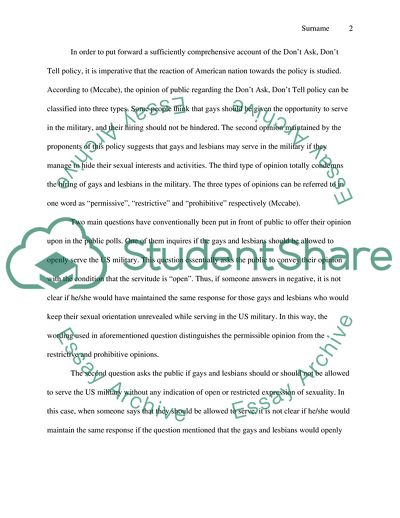Cite this document
(Dont Ask, Dont Tell: The Law and Military Policy on Same-Sex Behavior Report Example | Topics and Well Written Essays - 1250 words - 1, n.d.)
Dont Ask, Dont Tell: The Law and Military Policy on Same-Sex Behavior Report Example | Topics and Well Written Essays - 1250 words - 1. https://studentshare.org/gender-sexual-studies/1751952-dont-ask-dont-tell
Dont Ask, Dont Tell: The Law and Military Policy on Same-Sex Behavior Report Example | Topics and Well Written Essays - 1250 words - 1. https://studentshare.org/gender-sexual-studies/1751952-dont-ask-dont-tell
(Dont Ask, Dont Tell: The Law and Military Policy on Same-Sex Behavior Report Example | Topics and Well Written Essays - 1250 Words - 1)
Dont Ask, Dont Tell: The Law and Military Policy on Same-Sex Behavior Report Example | Topics and Well Written Essays - 1250 Words - 1. https://studentshare.org/gender-sexual-studies/1751952-dont-ask-dont-tell.
Dont Ask, Dont Tell: The Law and Military Policy on Same-Sex Behavior Report Example | Topics and Well Written Essays - 1250 Words - 1. https://studentshare.org/gender-sexual-studies/1751952-dont-ask-dont-tell.
“Dont Ask, Dont Tell: The Law and Military Policy on Same-Sex Behavior Report Example | Topics and Well Written Essays - 1250 Words - 1”. https://studentshare.org/gender-sexual-studies/1751952-dont-ask-dont-tell.


